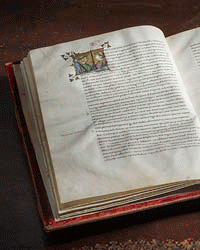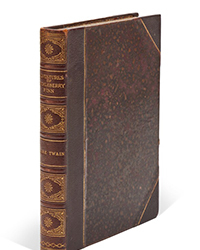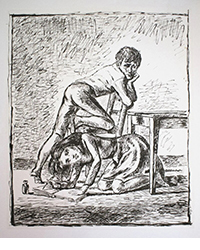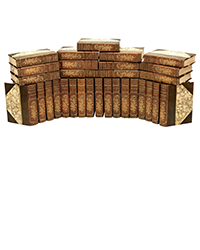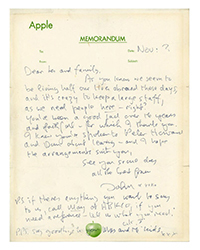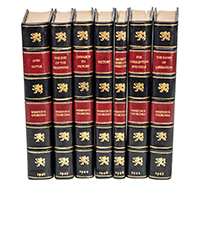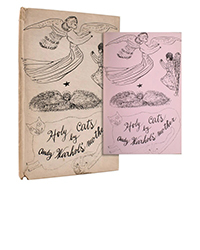Rare Book Monthly
Disappearing Ink: The Word Transformed
By Bruce McKinney
Newspapers, as extraordinary as they are and have been, are simply a way to deliver information. They perform an important task but are only aggregator and delivery mechanism. The same is true for radio and television. They deliver information. The same is true for libraries. They aggregate and deliver information on demand. So too encyclopedias aggregate and deliver information. We have a history of relying on methods, sometimes for generations, but our goal is efficiency, the means ultimately unimportant. We do form emotional attachments as ten of millions of us have with books and newspapers but our commitment is more a matter of personal preference than efficiency and logic. Hence our children, free of our history and habits, increasingly find their news on line and it is only a matter of time before the written word is freed of all printed constraints. Future generations' commitment will be to the information, not to its form. Already twenty-somethings find newspapers to be yesterday's news. No doubt their children will feel the same way about their approach. All forms of delivery and dissemination are means, not ends, all personal commitments to form simply habits.
Books are also under pressure. In future print runs will be shorter and options for reading text electronically greater. Kindle may or may not be the answer but there's no question that paper copies, while not yet endangered, are marked for extinction.
Two hundred years ago we relied upon horses for transportation but boats, then trains and eventually cars, buses and airplanes one by one increased our options, reduced our cost and increased our range and speed. Today, driving on a country road we may see a horse or two grazing. They were once, for many, the best option for transportation. Times change.
Steamboats had an effective life of about one hundred years. Railroads dominated the post Civil War era. The car, in barely a century, opened the world to broader development and now enters a second life, re-engineered for cost efficiency and reduced pollution. Cars will become smaller and perhaps communities more compact. We acclimate to change.
The internet has been with us now for almost twenty years and it too is changing. It was once essentially a mail system but has become much more. Today, as an octopus might, it encompasses aspects of what newspapers, radio and television do. It provides some of what libraries generally and encyclopedias specifically offer. It provides the maps we used to obtain at gas stations, dinner, hotel and entertainment reservations we used to make in person, by phone or fax. We now see movie schedules and reviews, and do both casual and serious research without leaving home. We'll soon take courses at major educational institutions; perhaps at the London School of Economics, the Sorbonne and myriad American universities to earn composite degrees that are matched to our needs and interests rather than to the theories and ideas of college administrators. In a few clicks these days we bring ourselves up to speed and along the way are redefined both by what we learn and what we learn how to learn.
The internet is also organizing us into ever more defined communities. In the electronic ether, we may be part of a group of insurance adjusters, poets, inner-city school teachers, even booksellers or book collectors. The internet permits us to interact with others sharing our interests and ideas. Our communities were once our churches, schools, villages and towns. Today they are potentially beyond number and are increasingly online.


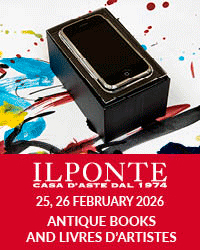
![Il Ponte, Feb. 25-26:
HAMILTON, Sir William (1730-1803) - Campi Phlegraei. Napoli: [Pietro Fabris], 1776, 1779. € 30.000 - 50.000 Il Ponte, Feb. 25-26:
HAMILTON, Sir William (1730-1803) - Campi Phlegraei. Napoli: [Pietro Fabris], 1776, 1779. € 30.000 - 50.000](https://ae-files.s3.amazonaws.com/AdvertisementPhotos/0372eeb9-97e1-47b2-baca-b3287d4704ee.jpg)
![<b>Il Ponte, Feb. 25-26:</b> [MORTIER] - BLAEU, Joannes (1596-1673) - Het Nieuw Stede Boek van Italie. Amsterdam: Pieter Mortier, 1704-1705. € 15.000 - 25.000 <b>Il Ponte, Feb. 25-26:</b> [MORTIER] - BLAEU, Joannes (1596-1673) - Het Nieuw Stede Boek van Italie. Amsterdam: Pieter Mortier, 1704-1705. € 15.000 - 25.000](https://ae-files.s3.amazonaws.com/AdvertisementPhotos/8f9ce440-b420-4407-8293-eb8e1b38ca19.jpg)
![<b>Il Ponte, Feb. 25-26:</b> TULLIO D'ALBISOLA (1899-1971) - Bruno MUNARI (1907-1998) - L'Anguria lirica (lungo poema passionale). Roma e Savona: Edizioni Futuriste di Poesia, senza data [ma 1933?]. € 20.000 - 30.000 <b>Il Ponte, Feb. 25-26:</b> TULLIO D'ALBISOLA (1899-1971) - Bruno MUNARI (1907-1998) - L'Anguria lirica (lungo poema passionale). Roma e Savona: Edizioni Futuriste di Poesia, senza data [ma 1933?]. € 20.000 - 30.000](https://ae-files.s3.amazonaws.com/AdvertisementPhotos/71bb9667-5d66-4aa8-96a2-9880c74a7a26.jpg)
